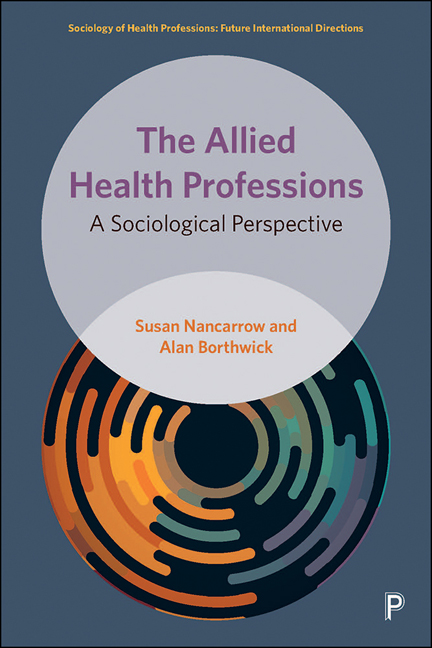Book contents
- Frontmatter
- Contents
- List of abbreviations
- Acknowledgements
- Editors’ overview
- Introduction
- 1 The allied health collective
- 2 Diversity in the allied health professions
- 3 The established allied health professions
- 4 Emerging allied health professions
- 5 The support workforce within the allied health division of labour
- 6 Specialisation in allied health
- 7 Post-professionalism and allied health
- Conclusion
- References
- Index
2 - Diversity in the allied health professions
Published online by Cambridge University Press: 05 January 2022
- Frontmatter
- Contents
- List of abbreviations
- Acknowledgements
- Editors’ overview
- Introduction
- 1 The allied health collective
- 2 Diversity in the allied health professions
- 3 The established allied health professions
- 4 Emerging allied health professions
- 5 The support workforce within the allied health division of labour
- 6 Specialisation in allied health
- 7 Post-professionalism and allied health
- Conclusion
- References
- Index
Summary
The allied health professions, and indeed all contemporary Western professions, have been shaped by a set of distinct social forces and contexts that were a product of their formative era. The Industrial Revolution saw the rapid organisation of labour at a time when social class, British colonialism and paternalism were dominant themes in much of the Western world. For the professions, the consequences have included a highly organised, hierarchical and strongly genderdifferentiated workforce. Social policies have evolved over the past half-century to try to explicitly reduce gender and racial inequalities in education, the workplace and health service delivery, with varying levels of success in allied health.
This context is important for understanding both the evolution of the professions through a sociological lens, and also their contemporary context. In many ways, the world has moved on but the professions (particularly the highly structured and gendered health professions) are relics of their post-industrial era formation. At the start of the 21st century, the stereotypical allied health profession is still predominantly female, middle-class and white. The narrow analysis of any areas of diversity from an allied health perspective means that this is a limited field; however, there are dominant paradigms in the literature on the sociology of the professions that are important for diversity. Gender is the obvious position; however, ethnicity and socio-economic status are also important considerations.
Intersectionality recognises that social differences and divisions do not operate separately, but rather intersect. Examining diversity from an intersectional perspective enables us to consider that several classification systems coexist and interact – such as gender, ethnicity/race, sexuality, socio-economic status and even professional status – without reducing them to singular positions (Styhre and Eriksson-Zetterquist, 2008).
We found no analysis of the diversity of the allied health professions collectively, and only sparse discussion of the diversity within the individual professions. Yet, diversity, in all its forms, is important to understanding the social identity of the professions and how they came to their current position, their underlying assumptions about others and the world, and the way they are perceived by others. As with other chapters in this book, it is our goal not only to paint a picture of the current position of allied health, but also use this knowledge to help understand how the future can be shaped in a way that most effectively reflects the value of the professions to society.
- Type
- Chapter
- Information
- The Allied Health ProfessionsA Sociological Perspective, pp. 57 - 82Publisher: Bristol University PressPrint publication year: 2021



